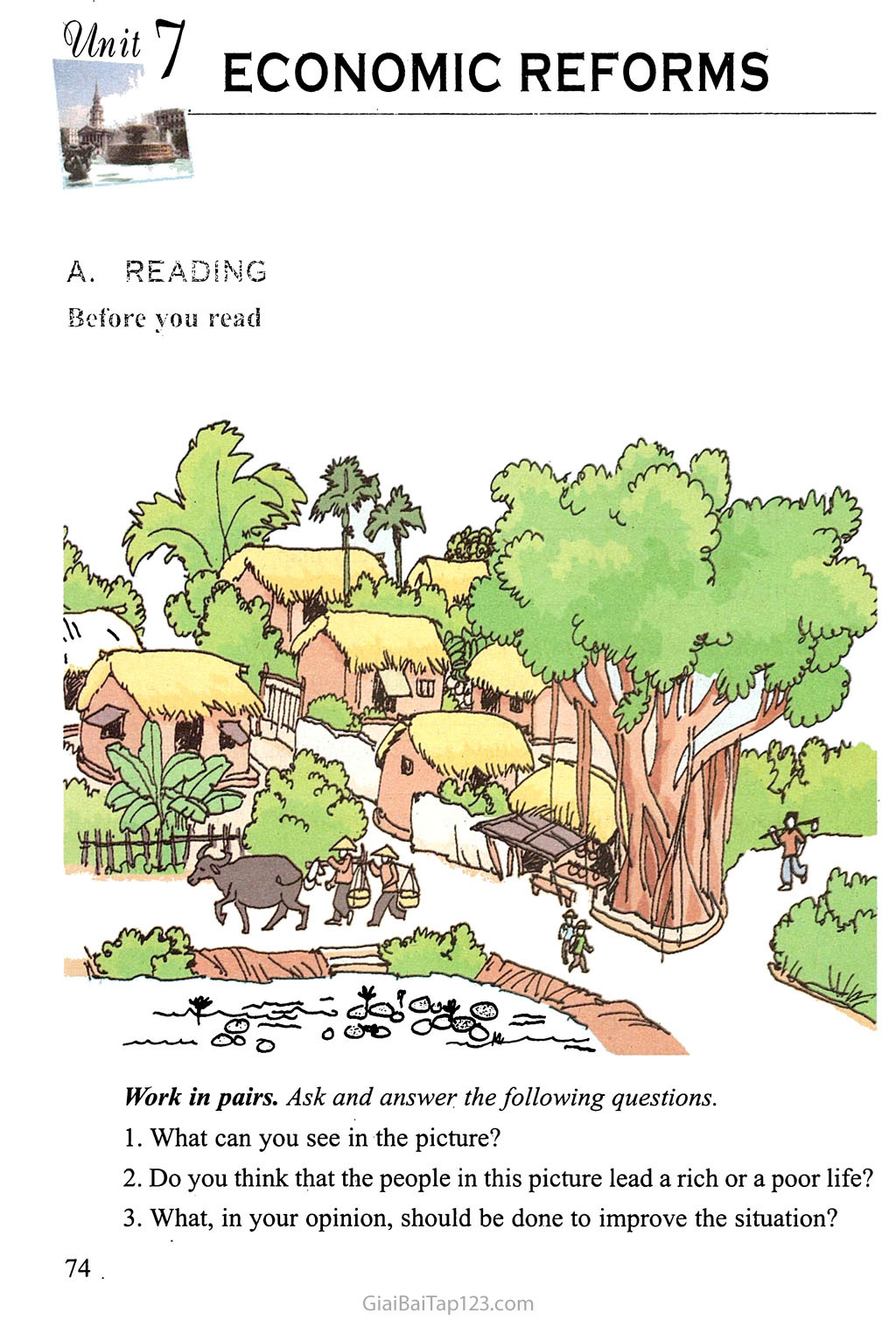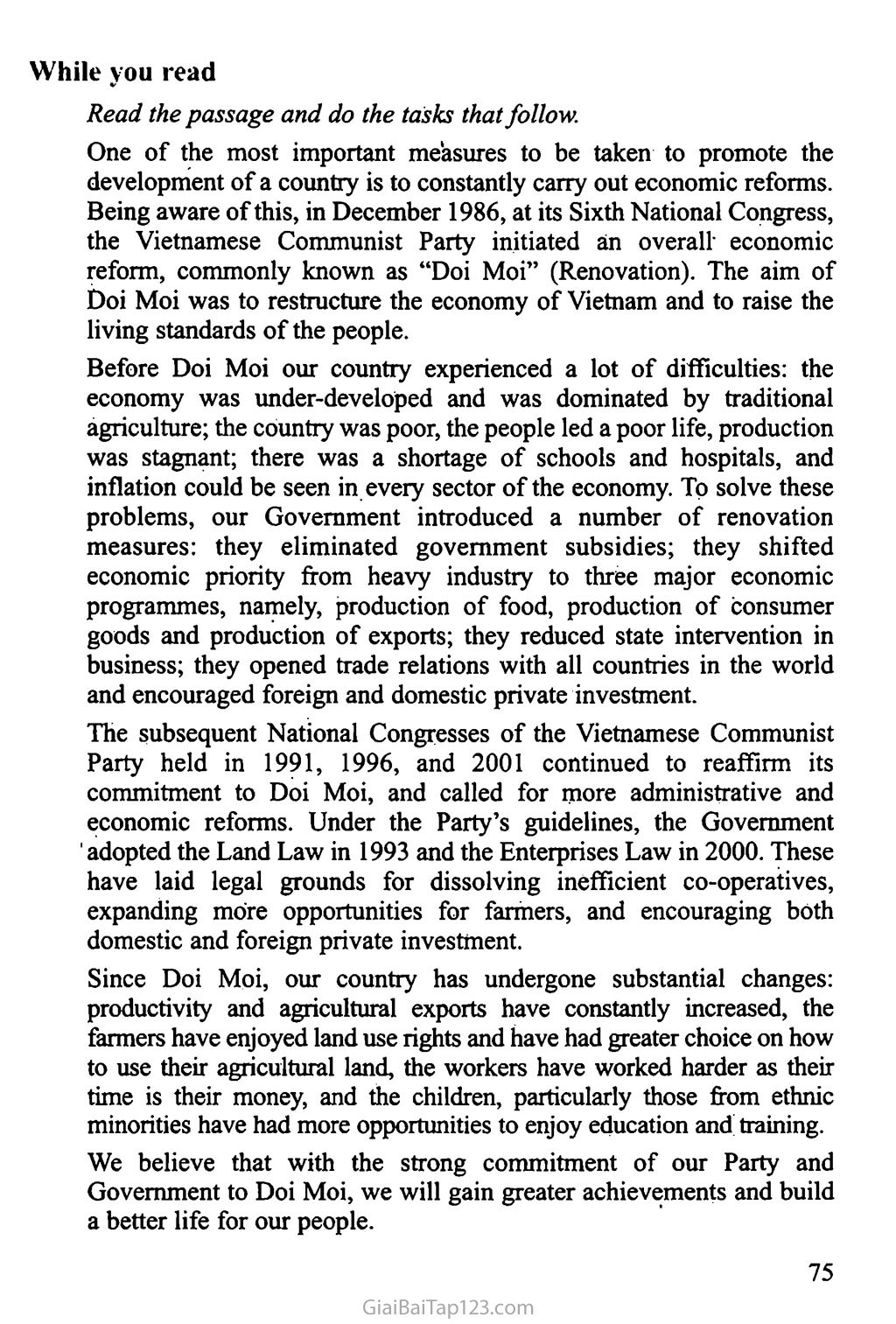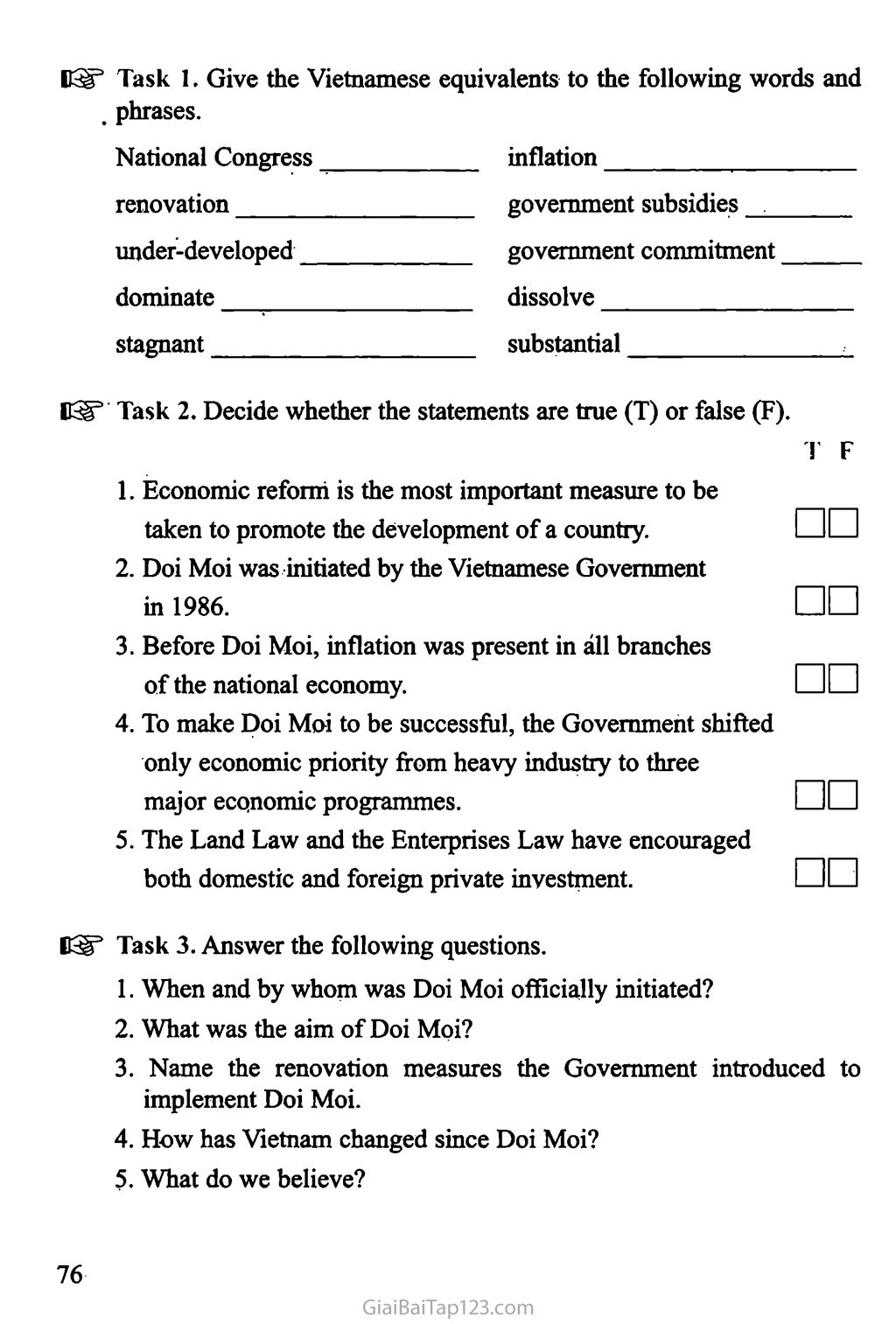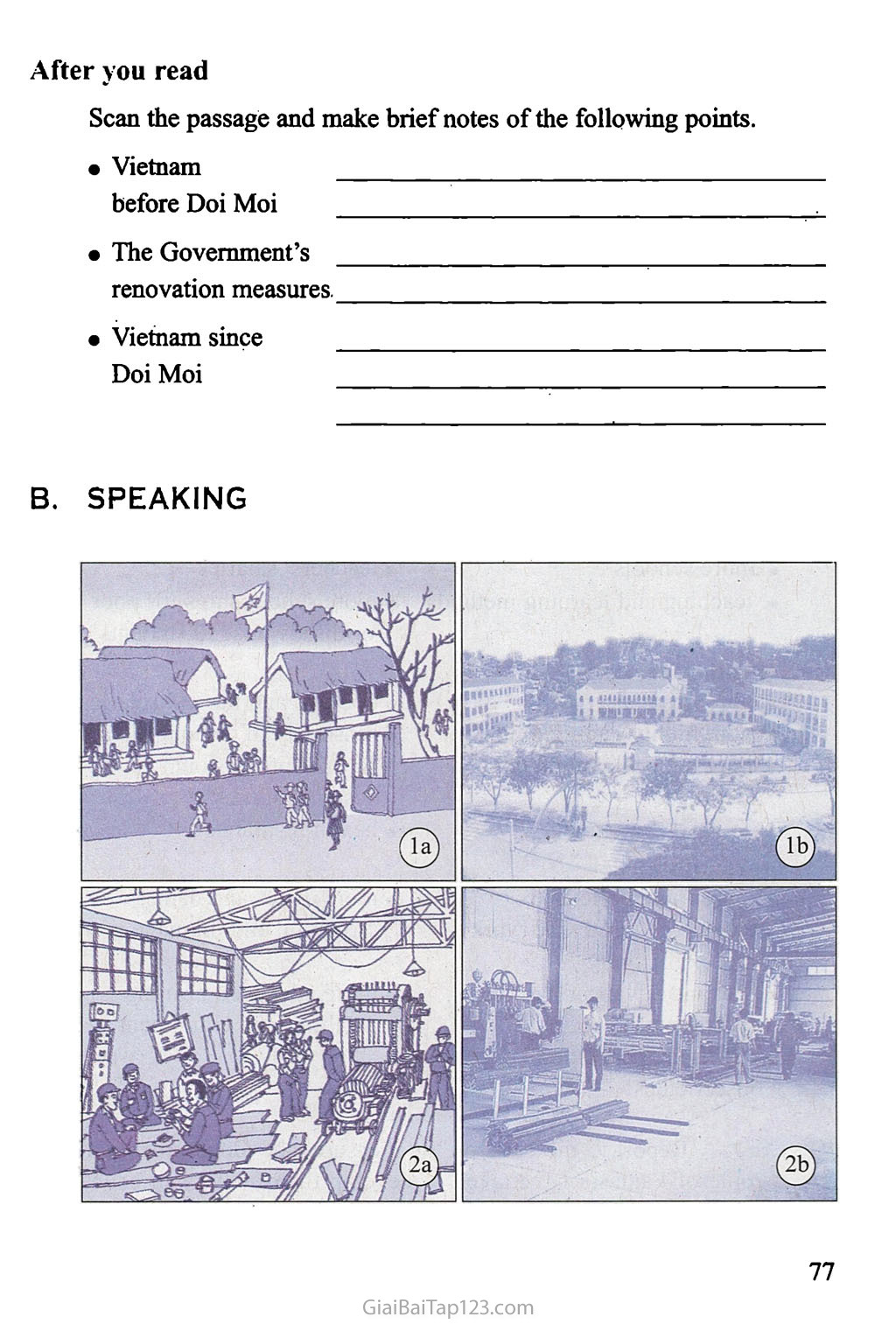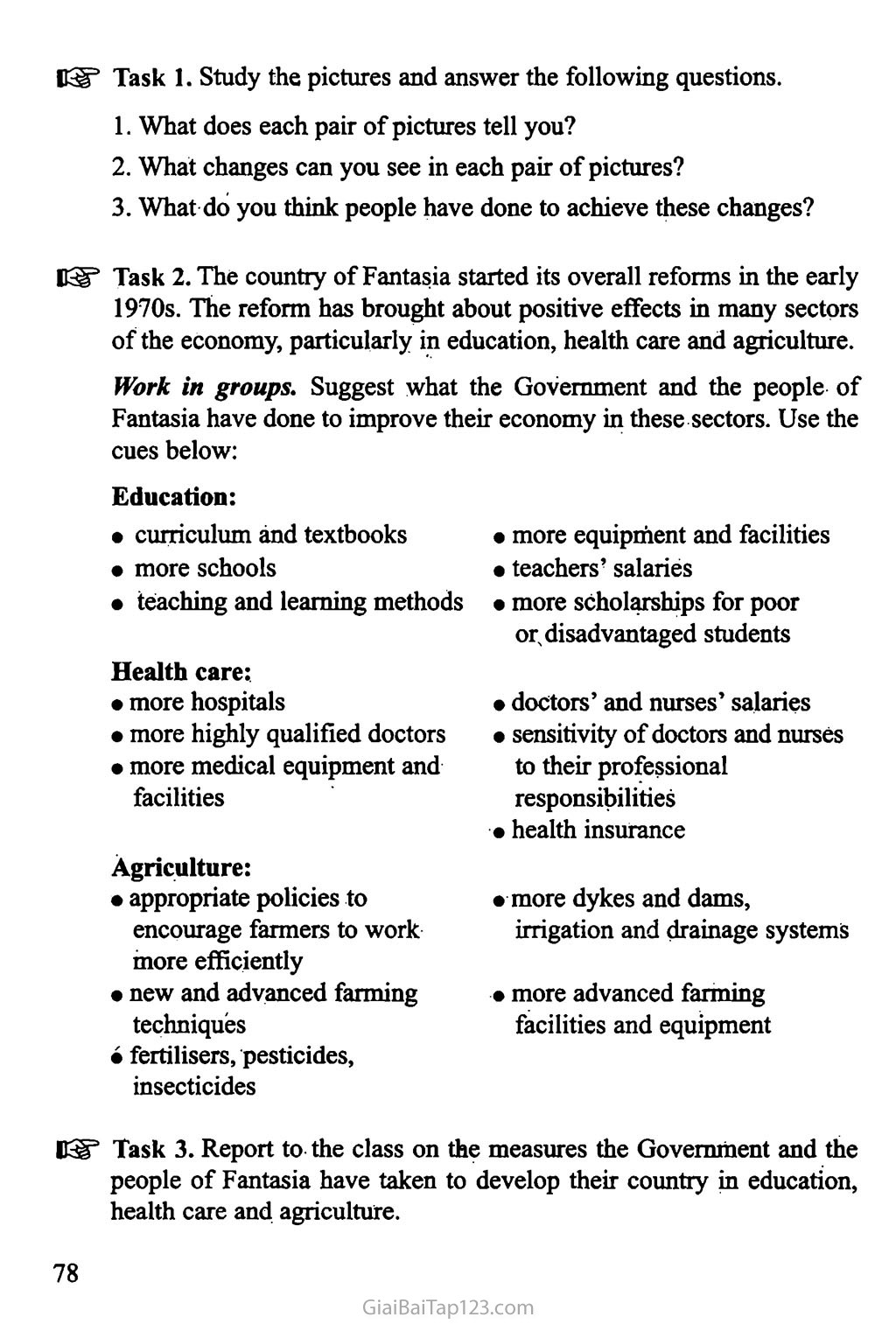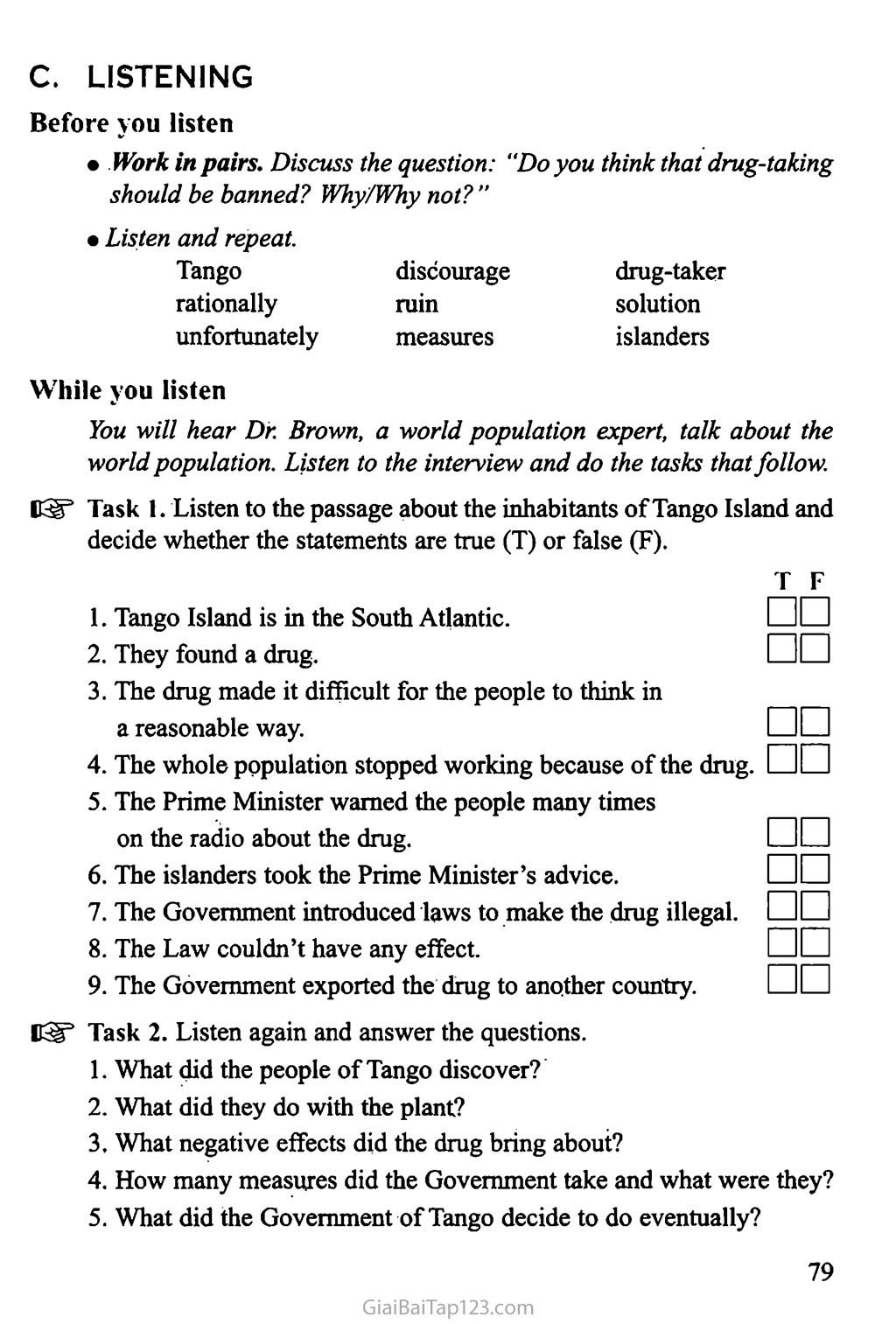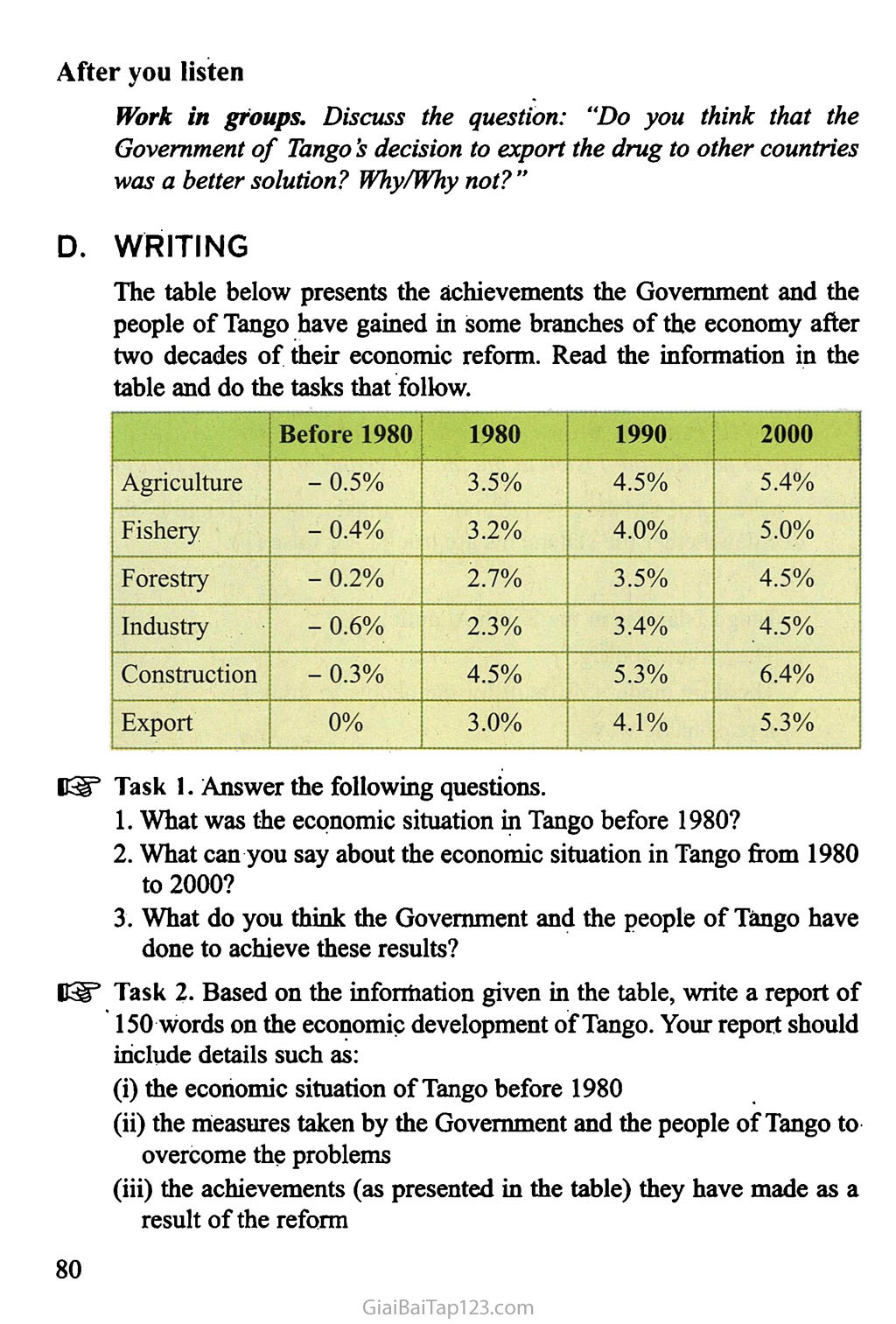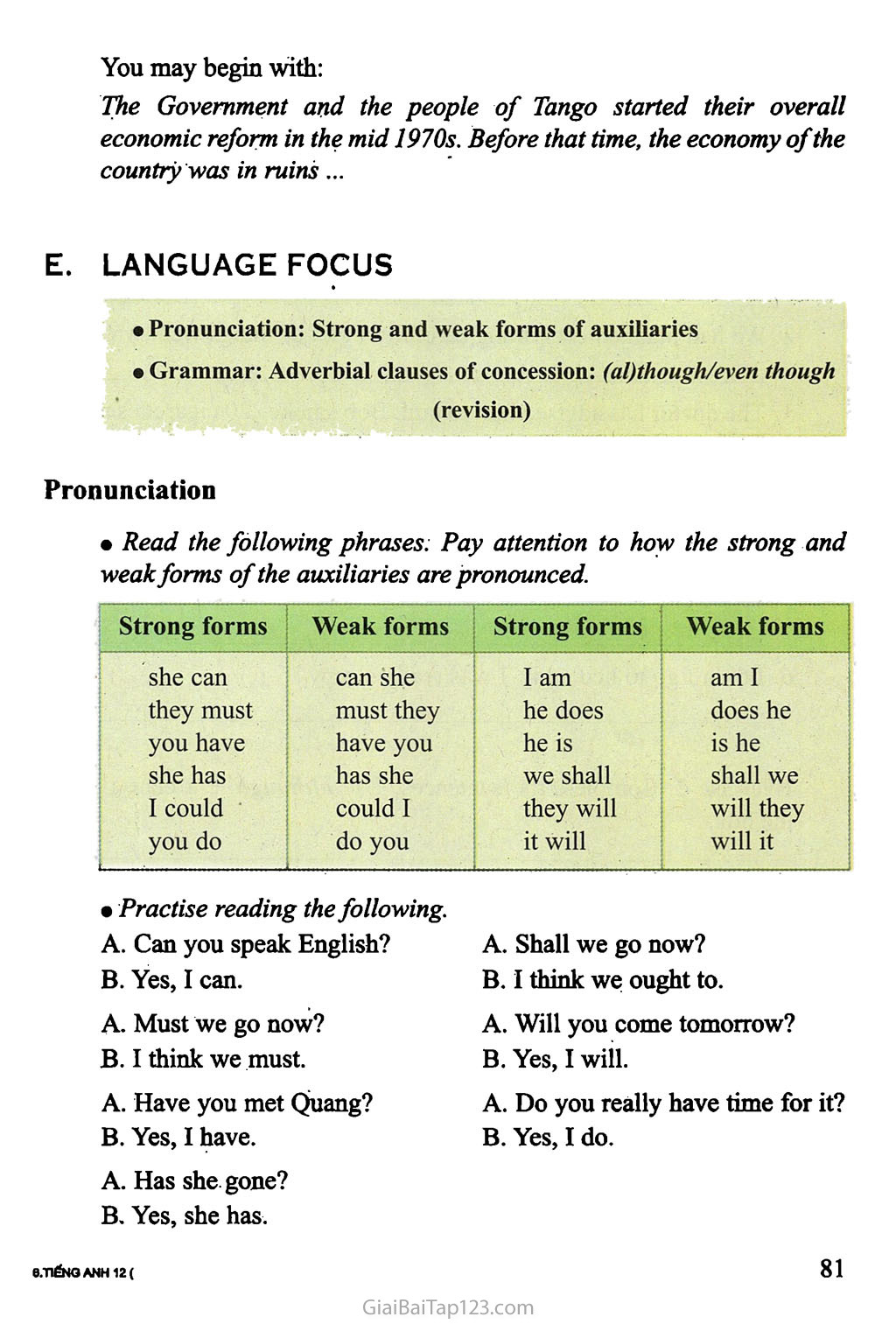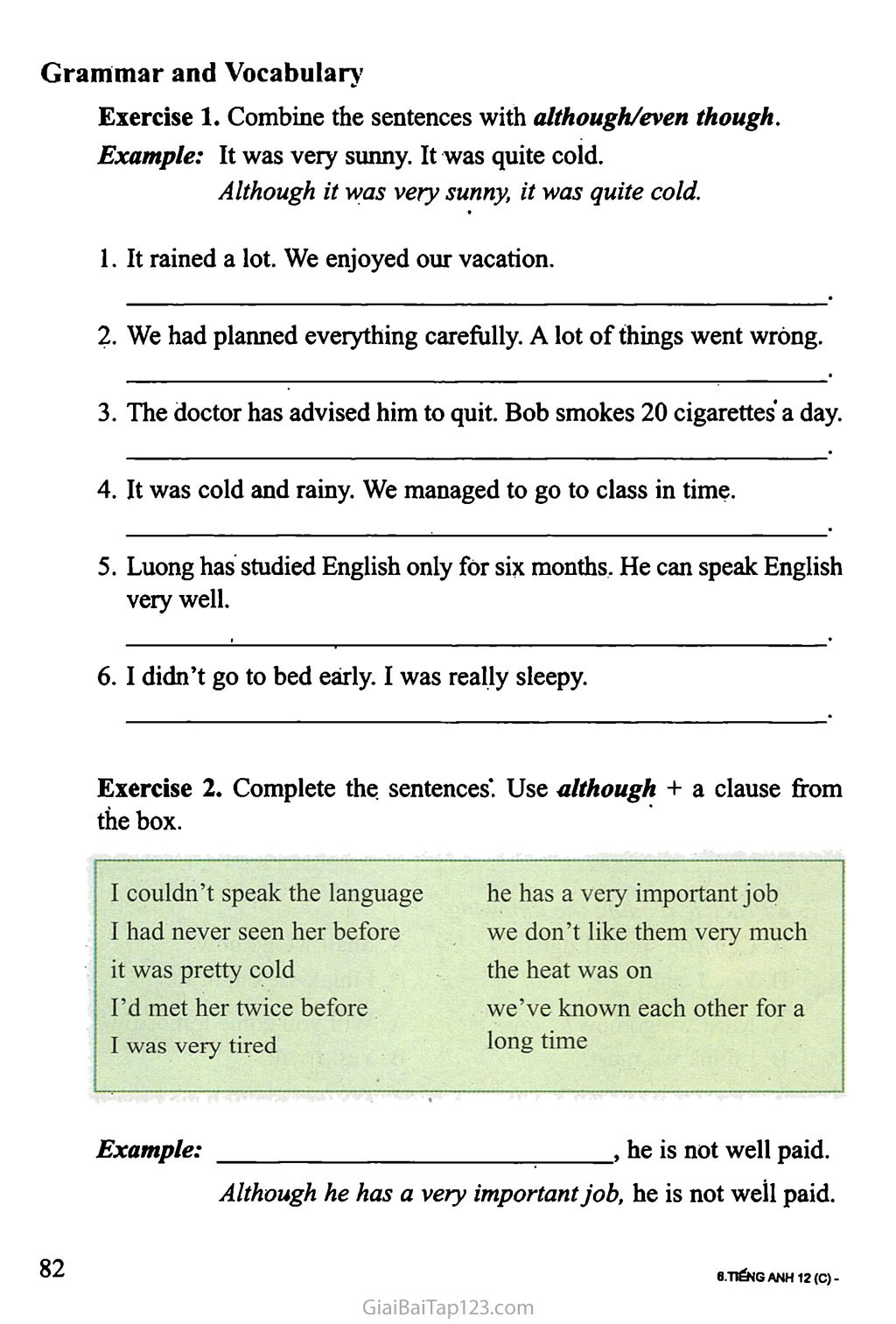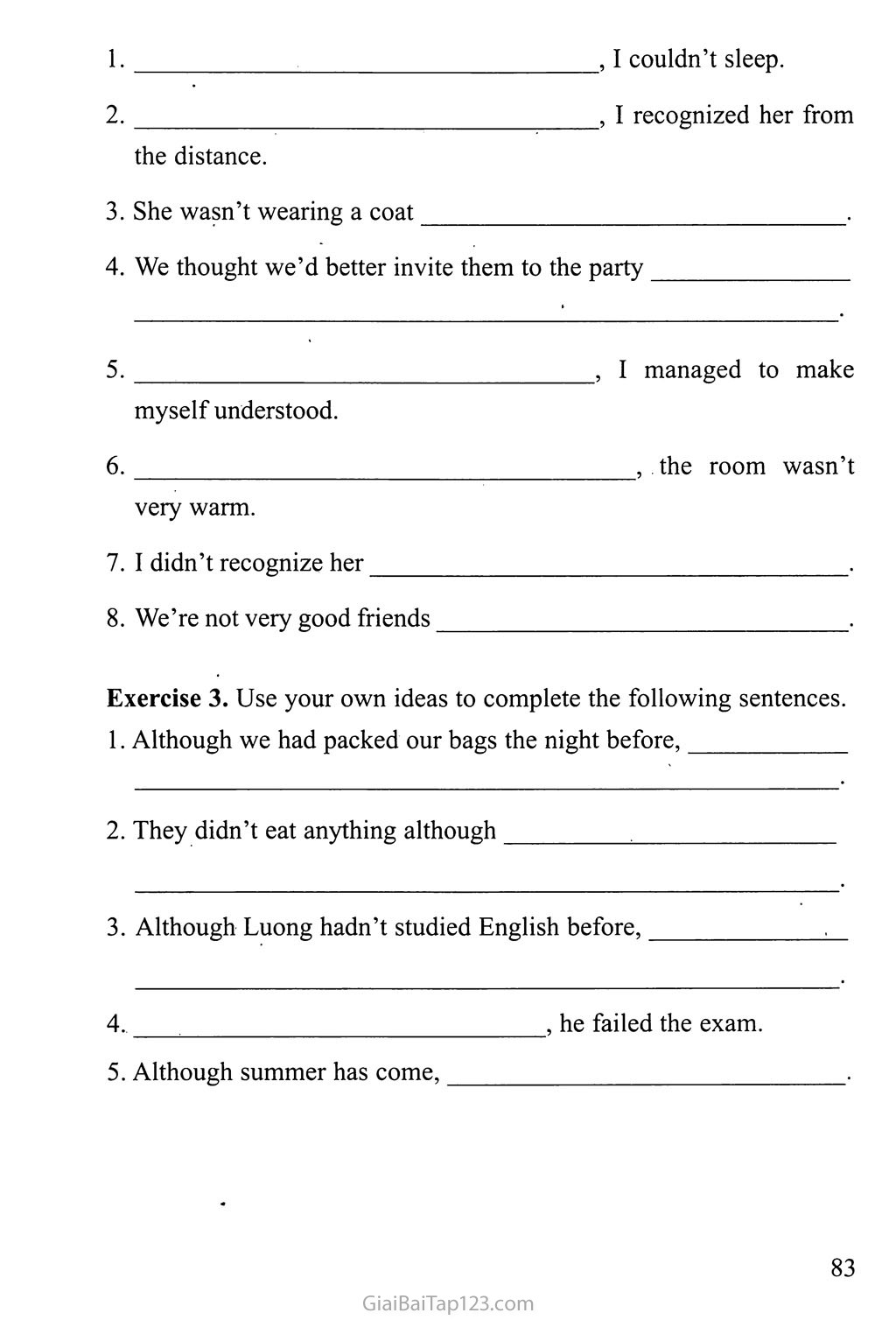SGK Tiếng Anh 12 - Unit 7: ECONOMIC REFORMS
Q//w ì t 7 ECONOMIC REFORMS A. READING Before you read Work in pairs. Ask and answer the following questions. What can you see in the picture? Do you think that the people in this picture lead a rich or a poor life? What, in your opinion, should be done to improve the situation? le you read Read the passage and do the tasks that follow. One of the most important measures to be taken to promote the development of a country is to constantly carry out economic reforms. Being aware of this, in December 1986, at its Sixth National Congress, the Vietnamese Communist Party initiated an overall economic reform, commonly known as “Doi Moi” (Renovation). The aim of Doi Moi was to restructure the economy of Vietnam and to raise the living standards of the people. Before Doi Moi our country experienced a lot of difficulties: the economy was under-developed and was dominated by traditional agriculture; the country was poor, the people led a poor life, production was stagnant; there was a shortage of schools and hospitals, and inflation could be seen in every sector of the economy. To solve these problems, our Government introduced a number of renovation measures: they eliminated government subsidies; they shifted economic priority from heavy industry to three major economic programmes, namely, production of food, production of consumer goods and production of exports; they reduced state intervention in business; they opened trade relations with all countries in the world and encouraged foreign and domestic private investment. The subsequent National Congresses of the Vietnamese Communist Party held in 1991, 1996, and 2001 continued to reaffirm its commitment to Doi Moi, and called for more administrative and economic reforms. Under the Party’s guidelines, the Government adopted the Land Law in 1993 and the Enterprises Law in 2000. These have laid legal grounds for dissolving inefficient co-operatives, expanding more opportunities for farmers, and encouraging both domestic and foreign private investment. Since Doi Moi, our country has undergone substantial changes: productivity and agricultural exports have constantly increased, the farmers have enjoyed land use rights and have had greater choice on how to use their agricultural land, the workers have worked harder as their time is their money, and the children, particularly those from ethnic minorities have had more opportunities to enjoy education and training. We believe that with the strong commitment of our Party and Government to Doi Moi, we will gain greater achievements and build a better life for our people. Give the Vietnamese equivalents to the following words and phrases. National Congress renovation inflation government subsidies under-developed dominate stagnant government commitment dissolve substantial Decide whether the statements are true (T) or false (F). Economic reform is the most important measure to be Answer the following questions. When and by whom was Doi Moi officially initiated? What was the aim of Doi Moi? Name the renovation measures the Government introduced to implement Doi Moi. How has Vietnam changed since Doi Moi? What do we believe? After you read Scan the passage and make brief notes of the following points. Vietnam before Doi Moi The Government’s renovation measures Vietnam since Doi Moi Study the pictures and answer the following questions. What does each pair of pictures tell you? What changes can you see in each pair of pictures? What do you think people have done to achieve these changes? The country of Fantasia started its overall reforms in the early 1970s. The reform has brought about positive effects in many sectors of the economy, particularly in education, health care and agriculture. Work in groups. Suggest what the Government and the people of Fantasia have done to improve their economy in these sectors. Use the cues below: Education: curriculum and textbooks more schools teaching and learning methods Health care: more hospitals more highly qualified doctors more medical equipment and facilities Agriculture: appropriate policies to encourage farmers to work more efficiently new and advanced farming techniques fertilisers, pesticides, insecticides more equipment and facilities teachers’ salaries more scholarships for poor or disadvantaged students doctors’ and nurses’ salaries sensitivity of doctors and nurses to their professional responsibilities health insurance more dykes and dams, irrigation and drainage systems more advanced farming facilities and equipment Report to the class on the measures the Government and the people of Fantasia have taken to develop their country in education, health care and agriculture. c. LISTENING Before you listen Work in pairs. Discuss the question: “Do you think that drug-taking should be banned? Why/Why not? ” Listen and repeat. Tango discourage drug-taker rationally ruin solution unfortunately measures islanders While you listen You will hear Dr. Brown, a world population expert, talk about the world population. Listen to the interview and do the tasks that follow. Listen to the passage about the inhabitants of Tango Island and decide whether the statements are true (T) or false (F). Tango Island is in the South Atlantic. They found a drug. The drug made it difficult for the people to think in a reasonable way. The whole population stopped working because of the drug. The Prime Minister warned the people many times on the radio about the drug. The islanders took the Prime Minister’s advice. The Government introduced laws to make the drug illegal. The Law couldn’t have any effect. The Government exported the drug to another country. Listen again and answer the questions. What did the people of Tango discover? What did they do with the plant? What negative effects did the drug bring about? How many measures did the Government take and what were they? What did the Government of Tango decide to do eventually? After you listen Work in groups. Discuss the question: “Do you think that the Government of Tango s decision to export the drug to other countries was a better solution? Why/Why not?” y D. WRITING The table below presents the achievements the Government and the people of Tango have gained in some branches of the economy after two decades of their economic reform. Read the information in the table and do the tasks that follow. Before 1980 1980 1990 2000 Agriculture - 0.5% 3.5% 4.5% 5.4% Fishery - 0.4% 3.2% 4.0% 5.0% Forestry - 0.2% 2.7% 3.5% 4.5% Industry - 0.6% 2.3% 3.4% 4.5% Construction - 0.3% 4.5% 5.3% 6.4% Export 0% 3.0% 4.1% 5.3% Answer the following questions. What was the economic situation in Tango before 1980? What can you say about the economic situation in Tango from 1980 to 2000? What do you think the Government and the people of Tango have done to achieve these results? Based on the information given in the table, write a report of 150 words on the economic development of Tango. Your report should include details such as: the economic situation of Tango before 1980 the measures taken by the Government and the people of Tango to overcome the problems the achievements (as presented in the table) they have made as a result of the reform You may begin with: The Government and the people of Tango started their overall economic reform in the mid 1970s. Before that time, the economy of the country was in ruins ... LANGUAGE F Practise reading the following. Can you speak English? Yes, I can. Must we go now? I think we must. Have you met Quang? Yes, I have. Has she gone? Yes, she has. ocus Pronunciation: Strong and weak forms of auxiliaries Grammar: Adverbial clauses of concession: (al)thoughZeven though (revision) Pronunciation • Read the following phrases. Pay attention to how the strong and weak forms of the auxiliaries are pronounced. Strong forms Weak forms Strong forms Weak forms she can can she I am am I they must must they he does does he you have have you he is is he she has has she we shall shall we I could could I they will will they you do do you it will will it Shall we go now? I think we ought to. Will you come tomorrow? Yes, I will. Do you really have time for it? Yes, I do. Grammar and Vocabulary Exercise 1. Combine the sentences with although/even though. Example: It was very sunny. It was quite cold. Although it was very sunny, it was quite cold. It rained a lot. We enjoyed our vacation. We had planned everything carefully. A lot of things went wrong. The doctor has advised him to quit. Bob smokes 20 cigarettes a day. It was cold and rainy. We managed to go to class in time. Luong has studied English only for six months. He can speak English very well. I didn’t go to bed early. I was really sleepy. Exercise 2. Complete the sentences*. Use although + a clause from the box. I couldn’t speak the language he has a very important job I had never seen her before we don’t like them very much it was pretty cold the heat was on I’d met her twice before we’ve known each other for a I was very tired long time Example: , he is not well paid. Although he has a very important job, he is not well paid. , I couldn’t sleep. , I recognized her from the distance. She wasn’t wearing a coat - We thought we’d better invite them to the pally , I managed to make myself understood. , the room wasn’t very warm. I didn’t recognize her _. We’re not very good friends . Exercise 3. Use your own ideas to complete the following sentences. Although we had packed our bags the night before, They didn’t eat anything although Although Luong hadn’t studied English before, , he failed the exam. Although summer has come,

